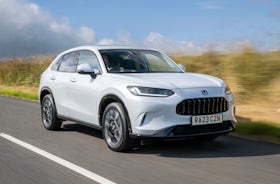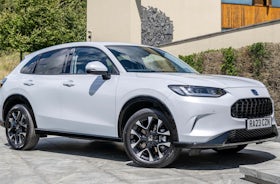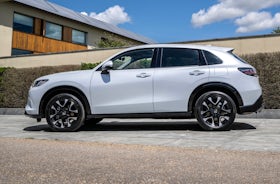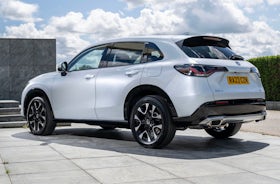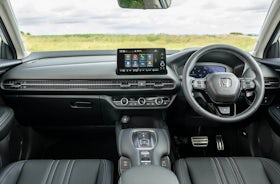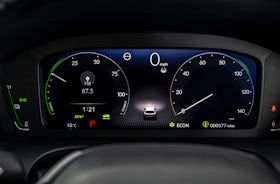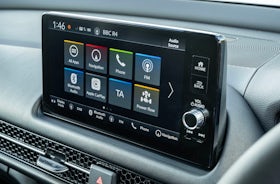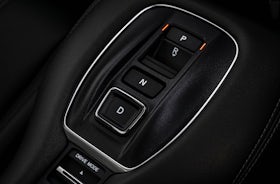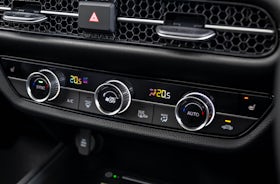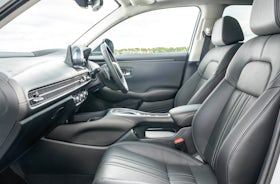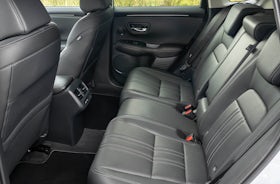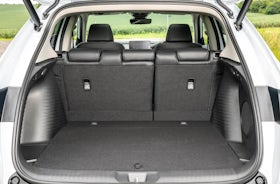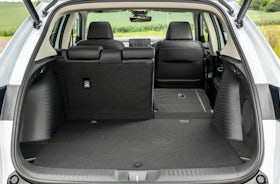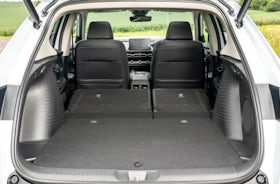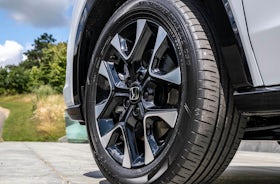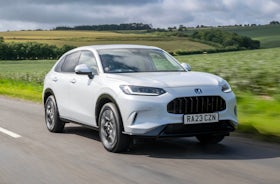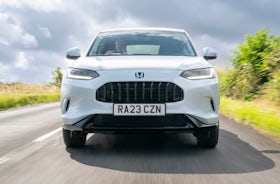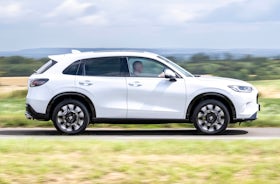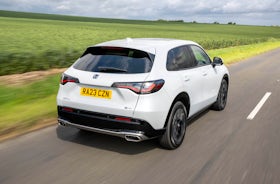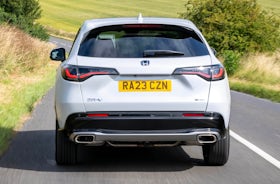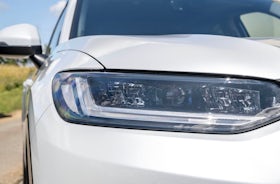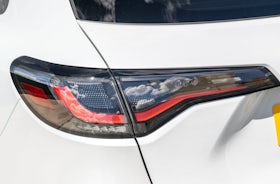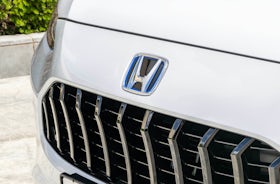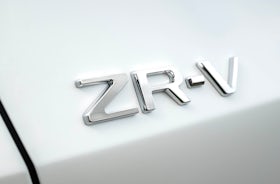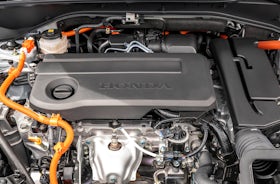Honda ZR-V Review & Prices
The Honda ZR-V is a mid-size SUV that features an efficient powertrain and a stylish cabin, but it’s a shame it’s not spacious as alternatives
- Cash
- £38,811
- Monthly
- £504*
- Used
- £25,675
What's good
What's not so good
Find out more about the Honda ZR-V
Is the Honda ZR-V a good car?
The Honda ZR-V is a mid-size SUV, one of the most popular types of car in the UK. With alternatives such as the Nissan Qashqai, Hyundai Tucson and Kia Sportage – and many more besides – the Honda has some seriously stiff competition.
Sitting in the middle of the Japanese brand’s SUV line-up between the smaller HR-V and larger CR-V, the ZR-V is like a puzzle piece that just slots snuggly in the middle of the two – being a bit longer than the HR-V and a bit shorter than the CR-V.
But there isn’t a connection between the ZR-V and its siblings when it comes to design. It doesn’t really fit with how Honda has styled its other higher-riding vehicles, and it looks like three separate people have taken the front, rear and sides before mashing them together into one – it’s odd.
That can’t be said about the cabin though. Much like the carwow Buy-it Award-winning latest Civic, the ZR-V’s cabin is excellently thought out, with a crisp design, clear displays and good amounts of storage.
In the back, you get a decent amount of space, with only taller adults in danger of struggling for headroom – although the sunroof fitted on top-spec Advance cars does steal some space. Kneeroom is good, but underthigh support could be better.
One major drawback of the ZR-V is its boot. The 380-litre space is well-shaped, but it’s well down on the offerings from alternatives, which have figures in the 500s.
There’s only one engine fitted to the ZR-V and it’s the same 2.0-litre petrol hybrid unit paired to a CVT automatic transmission that’s also found in the Civic hatchback. Developing 184hp and 314Nm of torque, you can get from 0-60mph in 7.9 seconds.
The small battery pack gets its charge from the petrol engine, yet the driving experience is more like a pure EV as the electric motors power the wheels
But the most impressive thing about the power setup is the efficiency. The official figure sits at 48.7mpg, but we got 51mpg without much trouble.
With the electric motor mounted on the front axle doing a lot of the work, you’ll see a dip in that efficiency if you do a lot of motorway miles, as the petrol engine is constantly charging the battery the motor runs off. You’ll also notice a lot of noise from the tyres.
On a twisty road, the ZR-V is not shoddy by any means. It holds the road well, has decent punch out of corners when you floor the throttle and body roll is kept mostly in check.
You will feel some firmness through the suspension at times though, particularly noticeable over sharper bumps in town. But slower driving is where the ZR-V is truly excellent. The electric motor has enough zip to get you up to speed and you’ll barely hear the petrol engine kick in when it’s needed. Visibility and manoeuvrability are also great.
While the Honda ZR-V is by no means a bad car thanks to its lovely cabin design and efficient power setup, there are some pieces of the puzzle missing to make it a true challenger in the mid-size SUV market.
If you want to get the best deals on the Honda ZR-V or other new Hondas, check out carwow, where we can also offer you great used Honda deals. To change your car altogether, carwow can help out there too, as you can sell your car with the help of our trusted dealers.
How much does the Honda ZR-V cost?
The Honda ZR-V has a RRP range of £40,780 to £44,330. However, with Carwow you can save on average £2,052. Prices start at £38,811 if paying cash. Monthly payments start at £504. The price of a used Honda ZR-V on Carwow starts at £25,675.
Our most popular versions of the Honda ZR-V are:
| Model version | Carwow price from | |
|---|---|---|
| 2.0 eHEV Elegance 5dr CVT | £38,811 | Compare offers |
At first glance, the ZR-V is much more expensive than the alternatives. Without reading into it further though, you’d miss the fact that the Honda is actually very similarly priced if it’s put up like-for-like with models like the Nissan Qashqai e-Power and similarly-powered versions of the Hyundai Tucson and Kia Sportage. As there’s no other power option, you can only truly compare against alternatives with similar engines.
There’s no hiding the fact that it’s quite costly in this part of the market, but for that you get excellent equipment as standard across the range, such as adaptive cruise control and the large displays.
Performance and Drive Comfort
While the ZR-V is quiet and composed in town, you will hear a lot of tyre roar and wind flutter on the motorway
In town
With its super quiet electric motor, the ZR-V glides through town without too many issues. As an EV-driven car, you get decent acceleration from the motor to help you away from junctions, and the petrol engine only kicks in if you really want to push hard.
You have a large rear window, two ample wing mirrors and relatively slim A-pillars to ensure you have good visibility. That’s aided by a rear-facing camera as standard, while front and rear parking sensors help with manoeuvring.
What you will notice is that sharper bumps will be more pronounced in the cabin if you’re driving at slower speeds, but they’re smoothed out well the faster you go.
On the motorway
Even with plenty of sound insulation to offer a quieter cabin, the ZR-V suffers from a lot of tyre roar, and wind flutter from the wing mirrors, at motorway speeds. All cars come with 18-inch alloys – of varying design – so getting a smaller set of wheels isn’t possible to help with that.
Turn the radio up though, and while you’ll still notice that exterior disturbance, the ZR-V is very comfortable to travel in. The seats are well-bolstered – barring some lumbar support – and you can get in position to have a good view around.
Getting up to speed with the electric motor driving the front wheels is no trouble, and although it’s not lightning quick, it’s more than fast enough. Overtakes are simple, and with blind spot monitoring and adaptive cruise control as standard, cruising is very simple.
On a twisty road
The ZR-V is by no means a performance SUV, but it handles itself well. It feels better to drive quickly than most of its alternatives, as the steering is light at first but has more weight as you turn the wheel tighter.
You won’t feel too much body roll unless it’s a particularly sharp turn, so you can take corners at the speed limit without much hassle. You also shouldn’t expect much disruption through the suspension, unless there’s a particularly rough surface, at which point the ZR-V starts to feel less planted.
You can engage Sport mode – as well as Comfort, Eco and Snow settings – but doing so doesn’t change the driving experience much. There’s a touch more throttle response and the steering has a little extra weight, but it’s not necessary unless you really want to.
Space and practicality
The cabin is spacious enough for most with plenty of storage, but the ZR-V struggles a bit in terms of practicality
Up front in the ZR-V, you’ll find ample room for the driver and passenger, as well as good levels of adjustment in the seats. Sport and Advance models get electric seat adjustment to make the process even easier.
The door bins are of a decent size, but while there’s a good space for a water bottle, the rest of it is a bit thin. You’ll also find a couple of charge ports and a place for your devices under the central armrest, while two cupholder sit in front of another storage bin. The cupholders are quite large though, so smaller cups and bottles can topple over.
Under the armrest, which annoyingly can’t be adjusted, there’s a deep space to keep things too.
Space in the back seats
People sitting in the back seats will have enough space to be comfortable. There’s good knee room, while head room is also rather good. That can be hampered by the sunroof on Advance models though, and under thigh support isn’t the best.
The doorbins are only big enough for one bottle each, while you have rather large pockets on the seat backs. There’s two USB-C charging ports for your devices, and folding the middle armrest down reveals two cupholders.
There’s two sets of ISOFIX points as well that are easy to get to, and though the door opening isn’t the widest, it’s more than roomy enough for you to get a bulky rear facing child seat in place.
Boot space
This is where the ZR-V falls behind its alternatives. You’ll only have access to 380 litres in the boot, and that’s reduced further if you choose the Advance model, as the Bose 12-speaker sound system’s subwoofer takes up 10 litres.
The NIssan Qashqai, which has a similar hybrid system with its e-Power version, offers 435 litres, while the self-charging hybrid Kia Sportage and Hyundai Tucson models offer 587 litres and 616 litres respectively.
You don’t get through loading with the ZR-V either, but you get split-folding to help with loading longer items. There’s a handy space to put the load cover under the floor though, as well as a load lip level with the floor so you can slide things in and out easily enough.
Folding down the seats opens up a 1,312-litre space. There’s no ridge to push things over, so you can load larger items easily. You’ll also see hooks either side to hang bags and a 12V socket.
Interior style, infotainment and accessories
The interior styling of the ZR-V is excellent and it’s very simple to use. It lacks a spark of colour though, with lots of black and grey surfaces
With the ZR-V drawing a lot of inspiration from the similarly-sized Civic hatchback, the interior design of the SUV is excellent. It’s got simple lines with metallic detailing and a bar that crosses the entire cabin housing the air conditioning vents – with easy-to-use toggles to direct the airflow.
The quality of the materials used are rather good, with a lot of synthetic leather on top of the dashboard and around the button-press gear selector. There’s some piano black plastic that can get scratched and smudged, but there’s not a lot of it.
You get climate control buttons and dials separate from the 9.0-inch infotainment screen, which are super easy to use. The infotainment system itself is also simple to use, with large graphics that are clear and a responsive touchscreen.
You can connect your smartphone through Apple CarPlay and Android Auto, but only the Apple system can be connected wirelessly.
There are touches of colour on the touchscreen’s graphics, but there's a lot of grey and black on the display. That theme continues through the rest of the cabin, with cloth upholstery as standard on the seats, while the leather offered on the top-spec Advance car gets some silver stitching.
Behind the standard-fit leather steering wheel is a 10.2-inch digital display. With customisable graphics and multiple views, you can have it as you please. The screen has a dark background, so the coloured graphics do pop and it’s easy to read. Top-spec cars also get a head-up display, which is simple to read too.
Honda doesn’t offer the ZR-V with many options at all, with different wheel designs and colours the main decision you’ll need to make. There are styling pack options to make it look either rugged or sporty too.
MPG, emissions and tax
You only get one engine choice with the ZR-V – a 2.0-litre petrol engine paired to an electric motor and a CVT automatic gearbox. It develops 184hp and 314Nm of torque, allowing for a 0-60mph time of 7.8 seconds.
With that self-charging hybrid setup, the ZR-V will do 49.6mpg. But through our tests, we found you can easily get above 50mpg if you drive it carefully enough. That means with a full tank, you can do more than 620 miles.
Emissions are kept at a reasonable level of 144g/km CO2, meaning you won’t be paying too high a level of VED if you go for the entry Elegance model. But with both the Sport and Advance versions costing more than £40,000, you’ll need to pay the additional charge for that from the second to sixth year of ownership.
Safety and security
Honda fits the ZR-V with an impressive amount of safety equipment as standard as part of the Sensing setup. You get brake assist, adaptive cruise control, forward collision warning, lane keep and departure warning, traffic sign recognition and traffic jam assist.
You get all-round airbags, ISOFIX points on the rear seats, an immobiliser system and security alarm as well.
The ZR-V hasn’t been through the stringent Euro NCAP safety tests yet. But if Honda’s other recent products are to be used as a guideline, the ZR-V should score five stars.
Reliability and problems
As standard, all ZR-V models come with a three-year/90,000-mile warranty, while you can pay Honda for an additional guarantee when that initial period comes to an end – up to three years extra cover, that also includes road-side assistance.
As the ZR-V is an all-new model, you don’t have any previous recalls or issues to judge it by. If the current Civic is anything to go by though – which uses the same powertrain and is a similar size – you shouldn’t have concerns as its reliability record is excellent so far.
Honda ZR-V FAQs
- Cash
- £38,811
- Monthly
- £504*
- Used
- £25,675
Configure your own ZR-V on Carwow
Save on average £2,052 off RRP
Popular Honda car types
*Please contact the dealer for a personalised quote, including terms and conditions. Quote is subject to dealer requirements, including status and availability. Illustrations are based on personal contract hire, 9 month upfront fee, 48 month term and 8000 miles annually, VAT included.

